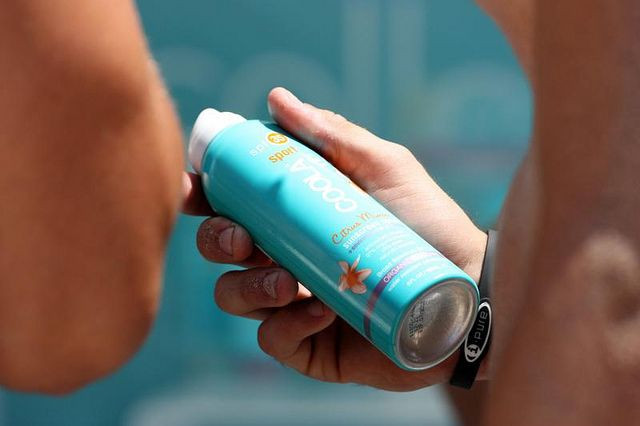FDA Warns Spray-On Sunscreen Could Catch Fire, Even On Your Skin

Although the dangers of using any type of aerosol product near open flames might be well known, and although it's common sense not to use spray-on sunscreen near an open flame, a new report by the Food and Drug Administration (FDA) has found some incidences of spray-on sunscreen-related burns. But there's a twist: all of the burns occurred after the spray had been applied.
The FDA reported five incidents in which people wearing spray-on sunscreen near an open flame and suffered burns that needed medical treatment. However, all of them suffered burns after the sunscreen had been applied. The agency said the sunscreen ignited from various sources, including lighting a cigarette, standing too close to a lit citronella candle, approaching a grill, and while welding.
"These incidents suggest that there is a possibility of catching fire if you are near an open flame or a spark after spraying on a flammable sunscreen — even if you believe you have waited a sufficient time for the sunscreen to dry and your skin feels dry," the FDA said.
Although the sunscreen in question, Banana Boat Ultra Mist, was voluntarily recalled from the market, the FDA warns that many other sunscreen products still available contain flammable ingredients, with the most dangerous one being alcohol.
The agency also advised that even though children weren't involved in the burns, parents and caretakers should exercise caution in using flammable products, since they have the potential to cause more serious burns compared to adults.
"Based on this information, we recommend that after you have applied a sunscreen spray labeled as flammable, you consider avoiding being near an open flame, sparks, or an ignition source," Dr. Narayan Nair, a lead medical officer at the FDA, said.
Lydia Velazquez, an FDA expert on sunscreen and other skin-related products, reiterated the benefits of using sunscreen in the report, saying that anyone in the sun can reduce their risk for early skin aging and skin cancer by regularly using a sunscreen with an SPF value of 15 or higher "and other sun protection measures including: limiting time in the sun, especially from 10 a.m. to 2 p.m., and wearing long-sleeve shirts, pants, hats, and sunglasses."
She also advised that people consider what activities they'll be participating in before they apply sunscreen.
"Just as you should choose a water-resistant sunscreen if you will be swimming or sweating, if you anticipate being near an open flame or another source that may give off sparks, look closely for flammability warnings on your sunscreen product and consider using a non-flammable sunscreen instead."
Published by Medicaldaily.com



























